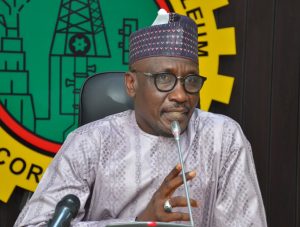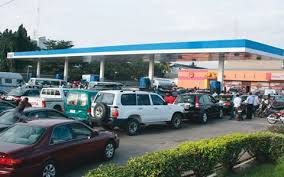*NNPC fingers four oil companies *MRS, Oando say NNPC firm imported dirty petrol *Fuel station owners, affected importers face litigations

Chuks Isiwu
Lagos – Nigerians awoke recently to the presence of a dirty petrol stock, which many have also classified as substandard, adulterated or toxic fuel, in some fuel stations.
The immediate effect of the product was damage to a considerable number of vehicles, whose owners had ventured into the affected fuel stations to refill their tanks.
Generally, the imported dirty fuel has taken a serious toll on consumers in the nation’s two major cities – former capital and economic centre, Lagos as well as the nation’s capital, Abuja, forcing industry regulators to quarantine volumes of the fuel from circulation to lessen its damaging impact on vehicles and equipment. But, the move has led to scarcity of the product and long queues at fuel stations.
Already, fuel station owners fear legal actions from motorists whose vehicles were damaged by the bad petrol while the Nigerian National Petroleum Corporation, NNPC, and companies involved in the importation and supply of the product might also not escape litigations.
NNPC fingers MRS, Oando, two other firms
Accusing fingers on the importation of the adulterated fuel had immediately pointed to the NNPC, being, as many assume, the sole importer of petroleum products into the country. But, the corporation was swift in deflecting the accusation and fingering four oil firms, including Oando and MRS Oil, as culprits in the supply and distribution of the toxic fuel. The other two companies, according to the NNPC, are Duke Oil and Emadeb/Hyde/AY Maikifi/Brittania-U Consortium.
Explaining how the companies were discovered and how the product arrived Nigeria, the NNPC Group Managing Director, Mallam Mele Kyari, stated that the corporation received a report on January 2022 from its quality inspector on the presence of emulsion particles in Premium Motor Spirit, PMS, or petrol cargoes shipped to Nigeria from Antwerp, Belgium.
Kyari said NNPC investigation revealed the presence of methanol in four petrol cargoes imported by MRS, Oando, Duke Oil and Emadeb/Hyde/AY Maikifi/Brittania-U___ Consortium.
He explained that the MRS import came in through the vessel, MT Bow Pioneer, and was loaded at LITASCO Terminal in Antwerp, Belgium; the Oando product was brought in through MT Elka Apollon, also loaded at LITASCO Terminal, Antwerp; that of Emadeb/Hyde/AY Maikifi/Brittania-U Consortium was imported via the vessel, MT Tom Hilde, loaded at same port; and Duke Oil’s import came in through MT Nord Gainer, which was also loaded at LITASCO Terminal.
He revealed that the petrol containing methanol was imported into the country through Direct-Sales-Direct-Purchase arrangement, which allows the state oil company to deliver monthly crude oil lifting on Free on Board, FOB, basis to suppliers, expected to deliver petroleum products of Nigerian standard specification to NNPC, in return.
According to the NNPC Group Managing Director, petrol coming into the country were not usually tested for level of methanol content as cargoes’ quality certificates issued at the loading port in Belgium, by AmSpec Belgium already covers the product, in terms of indicating that the product complied with Nigerian specification.
Besides, he said, NNPC quality inspectors including SGS, G&G, GMO and GeoChem also conducted tests before products were discharge, which showed the cargo met quality standard.
Kyari added: “As a standard practice for all PMS import to Nigeria, the cargoes were equally certified by inspection agent appointed by the Midstream and Downstream Petroleum Regulatory Authority (NMDPRA) has met Nigerian specification.
“It is important to note that the usual quality inspection protocol employed in both the load port in Belgium and our discharge ports in Nigeria do not include the test for per cent of methanol content and therefore the additive was not detected by our quality inspectors.”

He revealed that in order to prevent further distribution of the bad fuel, the NNPC has directed the quarantine of all un-evacuated volumes of the product as he noted that efforts were on to resolve issues involved in the supply and discharge of the methanol blended product at some depots.
“In order to prevent the distribution of the petrol, we have ordered the quarantine of all un-evacuated volumes and the holding back of all the affected products in transit (both truck & marine).
“All defaulting suppliers have been put on notice for remedial actions and NNPC will work with the authority to take further necessary actions in line with subsisting regulations.
“NNPC wishes to reassure Nigerians that we are currently sourcing additional cargoes to ensure product sufficiency.”
According to him, the NNPC has ordered that all the affected products in transit (both truck & marine), should be withheld,” he stated
The Nigerian Midstream and Downstream Petroleum Regulatory Authority, NMDPRA, had earlier announced in a statement that petrol with methanol quantities above Nigeria’s specification, was discovered in the supply chain.
The industry watchdog said the product in question had been isolated and withdrawn fro the market to ensure vehicular and equipment safety.
“Our technical team, in conjunction with NNPC Ltd and other industry stakeholders, will continue to monitor and ensure quality petroleum products are adequately supplied and distributed nationwide.
“The source supplier has been identified and further commercial and appropriate actions shall be taken by the Authority and NNPC Ltd,” NMDPRA said in its statement.
MRS, Oando reacts
In its reaction to the NNPC Group Managing Director’s allegation against it, the MRS, in a statement, denied culpability in the importation of the dirty fuel. It maintained the NNPC may have a case to answer as the sole supplier of petrol in the country.
It said: “Due to current subsidy regime, NNPC is the sole supplier of all PMS in Nigeria. Consequently, the NNPC through their trading arm Duke Oil, supplied a cargo of PMS purchased from international trader Litasco and delivered it with Motor Tanker (MT) Nord Gainer. This vessel discharged in Apapa between the 24th and 30th of January, 2022”.
The company said it received the product in its depot and distributed the product to only eight of its stations in Lagos.
MRS referred to the accusation against it as mischievous, false and untrue, stressing that it remains a responsible corporate citizen and will not be involved in the purchase, importation, distribution or marketing of substandard petroleum products in the country.
In its own reaction, Oando Plc denied importing adulterated petrol into the country.
In a statement released to the Nigerian Exchange, Oando said it did not import and supply PMS that was adulterated or substandard, adding that the PMS it supplied met Nigeria’s import specification.
The company said in the statement: “Following media reports listing Oando as one of four importers that supplied methanol-blended Premium Motor Spirits into the country, we hereby state that Oando did not import and supply PMS that was adulterated or substandard.
“The PMS supplied by Oando met Nigeria’s import specification. We are committed to working assiduously with the NNPC and industry, in order to identify the root cause(s) of the subsequent contamination of the PMS supplied.
“We want to assure the public that Oando, as a responsible corporate citizen, would not partake in the importation, distribution, or marketing of substandard petroleum products.”
FG may compensate vehicle owners
The Federal Government has since ordered investigation into the matter. It has also said it might compensate motorists whose vehicles got damaged by the bad fuel.
The Minister of State for Petroleum Timipre Sylva, dropped this hint in Abuja, saying the government would look into possible compensation for Nigerians whose automobiles had been damaged by the contaminated fuel. “We know that some people’s vehicles must have also been damaged; that is also going to be taken into consideration in dealing with the situation,” he said.
Meanwhile, there are indications that claims for repairs of vehicles affected by the imported dirty fuel would be sent to the Federal Government and the NNPC Limited.
The Federal Competition and Consumer Protection Commission (formerly Consumer Protection Council) said an arrangement has been put in place to compensate motorists whose vehicles were damaged by the adulterated fuel.
The Chief Executive Officer of the FCCPC, Babatunde Irukera, in an interview, said claims will be sent to retailers involved.
Irukera stated: “The FCCPC has been engaging with respect to the issues arising from irregular fuel sold in parts of the country.
“Current engagement shows that key relevant stakeholders have arranged for retailers to accept responsibility for repair and restoration of damaged vehicles/equipment. The respective legal departments are working to establish a framework that does not address injury that falls within the category stated above.”

Also speaking, human rights lawyer, Mr. Femi Falana, SAN, said claims and complaints would be sent to the FCCPC on Friday. “We will be sending complaints to the commission on Friday,” he stated.
However, the Secretary of the Independent Petroleum Marketers Association of Nigeria, Mr. Mike Osatuyi, said claims would be forwarded to the NNPC.
Osatuyi told Arise Television that some customers, whose vehicles were damaged by the adulterated fuel, attacked filling station attendants.
“We got attacked from some customers because they believe that we are into sharp practices and when they buy fuel and their vehicle gets spoilt, then they ask us to repair their vehicle. I am sure you will see videos on social media of customers parking their cars at filling stations because their cars broke down after buying fuel,” he stated.
When asked how they would receive compensation from the NNPC for distributing bad petrol, Osatuyi said, “We have told our members to identify those affected, which stations, which companies so that we can pass the information to the government. And since we are not responsible for importation, then there must be restitution. And the government must come in to mitigate the damage done to individuals’ vehicles.”
On whether IPMAN would be suing the government and the NNPC, Osatuyi said that was not an option for now because the association was still having talks with the oil company.
He, however, said if it does not get a favourable response from the NNPC, the marketers would seek redress.
Osatuyi added, “We are not going to sue the government, but we are going to collect data of affected stations and what it cost us and pass it to the authority so that we don’t have problems. This has happened and they are trying to mitigate the problem.”
On whether he was sure of compensation, he responded: “They have no choice. This is clear. It is when we engage them and present figures and if they are trying to be funny, we will do what we can do within the ambit of the law.”
Osatauyi advised the Federal Government to ensure that the country has refineries so that Nigeria could stop importing fuel.
NMDPRA won’t take responsibility
In a related development, the Chief Executive Officer, Nigerian Midstream and Downstream Petroleum Regulatory Authority, NMDPRA, Farouk Ahmed, said he would not take responsibility for the proliferation of the adulterated petrol even though his agency is in charge of ensuring that standards are adhered to.
Ahmed said during an interview that he just took over the leadership of the new agency a few months ago and this was what he met in place.
This came days after it was reported that President Muhammadu Buhari (retd.), ordered that he be issued with a query.
Responding to a question, the Authority’s CEO said those who acted on behalf of the NNPC did not “detect this material until it entered the system”.
“So, actually, I don’t want to pass blame but I also won’t take responsibility because this is our work and I have just been three months on the job and it is part of the learning curve and so we are learning and we will take the learning forward,” he said.
Follow us on twitter
